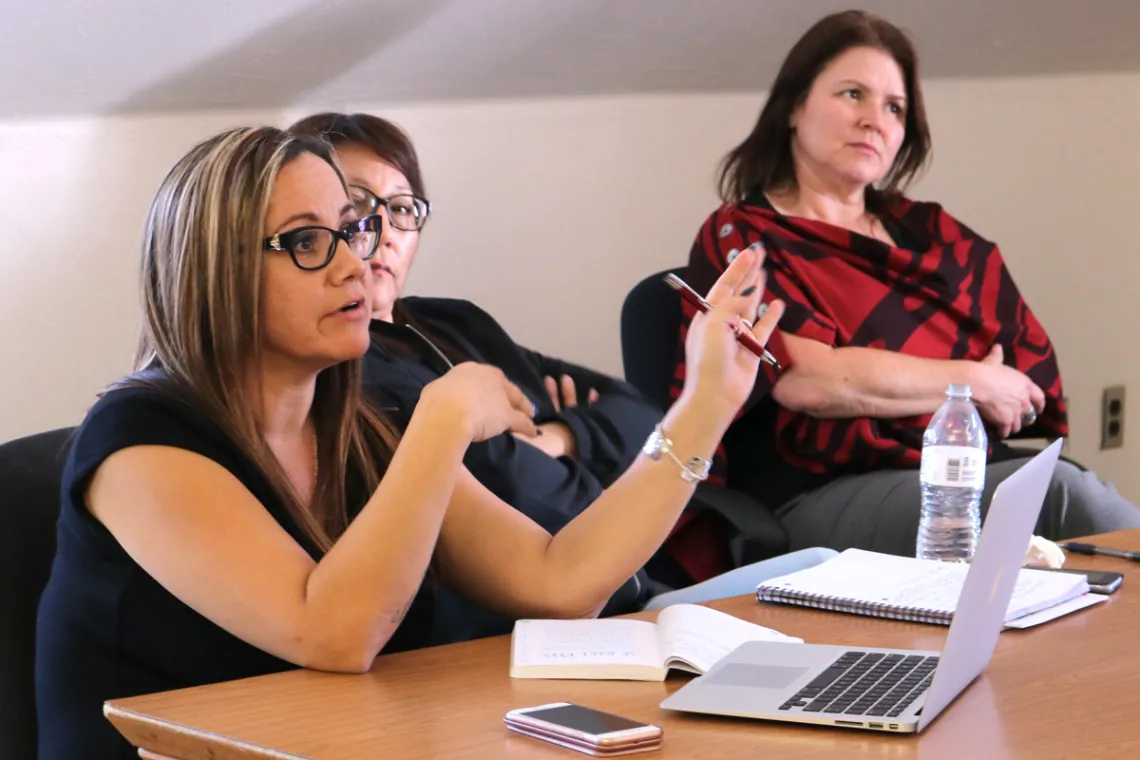In Boost to Indigenous Governance Leaders, University of Arizona Offers New Flexible Master’s Degree

Working professionals seeking training in indigenous governance leadership now have more educational opportunities, thanks to flexible new offerings from the University of Arizona James E. Rogers College of Law’s Indigenous Peoples Law and Policy Program and the University of Arizona Native Nations Institute.
Beginning in the spring 2020 semester, students can pursue a Master of Professional Studies (MPS) in indigenous governance through an expanded hybrid model that offers classes both in person and online and allows students to finish the degree in one year. The degree was previously only available in person.
[Apply now for the master of professional studies in indigenous governance.]
The core curriculum covers topics including Native nation building, comparative indigenous governance, intergovernmental relations, indigenous peoples’ human rights, and community development. Students may also complete concentrations of online courses in tribal justice, Native economic development, and natural resources, or customize a plan of study with in-person and online courses to meet their needs.
A graduate certificate in indigenous governance is also available through a combination of in-person classes and a capstone project completed remotely.
“These programs are designed to equip indigenous leaders, administrators, policymakers and academics with the foundational knowledge to lead Native nation building efforts in their communities,” says Robert A. Williams, Jr., Regents Professor, E. Thomas Sullivan Professor of Law and faculty co-chair of the Indigenous Peoples Law and Policy Program. “They address the self-determination skills and leadership development needs of Native nations and indigenous leaders around the world.”
The MPS and graduate certificate are administered by the University of Arizona Indigenous Governance Program, a partnership between the Indigenous Peoples Law and Policy Program and the Native Nations Institute that provides the latest research, knowledge, training and expertise in the emerging field of indigenous governance.
Combining Online Curriculum with Immersive In-Person Education
The hybrid degree model was designed with working professionals in mind. Students have flexibility in creating their own specialized courses of study from brief but intensive on-campus classes and robust online offerings.
Students in each program begin their studies with the three-week January in Tucson program, an immersive in-person learning experience at the University of Arizona campus led by distinguished faculty leaders in indigenous governance.
January in Tucson pairs research-based teaching on core curriculum with space for crucial dialogue between indigenous leaders, practitioners and community members from around the world. This unique educational experience provides students with new perspectives on familiar challenges and gives them opportunities to collaborate on affecting change in their communities.
After the January in Tucson program, students can then select from a diverse menu of online courses, externship opportunities and faculty-supervised capstone projects to complete the 30-credit master’s degree or 12-credit graduate certificate from their home location at their own pace.
[Learn more about the flexible master’s degree or graduate certificate in indigenous governance.]
“Our new catalog of online courses and supervised externship and capstone projects make it possible for tribal professionals and indigenous leaders who can’t spend a full year at the University of Arizona to complete their programs of study in their home communities,” says Williams.
Indigenous Governance Faculty Bring World Renowned Expertise to the Classroom
Indigenous Governance Program faculty have worked closely with indigenous communities to advance indigenous governance and self-determination in the United States, Canada, Australia, New Zealand, Latin America, Africa and Asia.
Professor Williams is a leading legal scholar who wrote the book on federal Indian law and has been instrumental in bringing the principles of Native nation building into the legal context. Professor Joseph Kalt and Stephen Cornell are the co-founders of the Harvard Project on American Indian Economic Development and are both leading scholars and practitioners, demonstrating how economic and community development furthers Native nation building. Professor Miriam Jorgensen is widely known for her research on how the principles of Native nation building can be used to strengthen meaningful self-determination and sustainable economic and community development for indigenous peoples.
Program Details and Application Info
For more information about the Master of Professional Studies in Indigenous Governance or the graduate certificate, including how to apply, visit the Indigenous Governance Program or contact program manager Tory Fodder at igp@email.arizona.edu or 520-621-3093.
About The Indigenous Peoples Law and Policy Program (IPLP)
The Indigenous Peoples Law and Policy (IPLP) Program at the University of Arizona James E. Rogers College of Law was established in 2001 in order to protect and promote indigenous peoples' rights and increase the representation of Native and indigenous lawyers and advocates within the practice of law and legal academia. The IPLP Program partners with tribes, tribal organizations and indigenous communities in the United States and around the world on precedent-setting cases on indigenous peoples’ rights before domestic legal forums, tribal courts, the Inter-American Commission on Human Rights and the United Nations.
About the Native Nations Institute (NNI)
The Native Nations Institute is part of the Udall Center for Studies in Public Policy at the University of Arizona. An outgrowth of the Harvard Project on American Indian Economic Development, it was founded by the Morris K. Udall and Stewart L. Udall Foundation and the University of Arizona and serves as a self-determination and self-governance resource for Native nations worldwide as they pursue their own political, economic and community development objectives. For more information, visit http://nni.arizona.edu.
